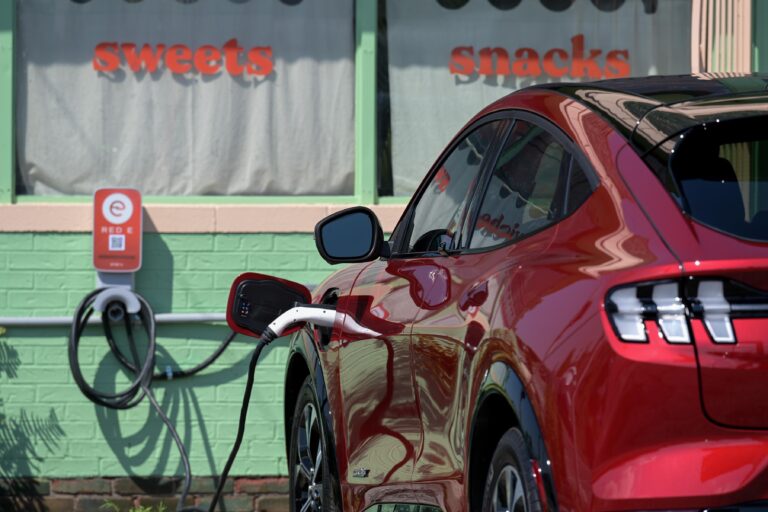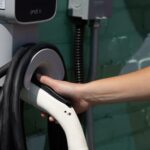
- Kim Kisner
- Business
- 01/24/2023
Partnerships Expand to Reduce Adoption Barriers, Accelerate Growth

Widespread electric vehicle (EV) adoption is crucial for achieving climate goals. However, the pace of EV adoption varies significantly across different income sectors, markets, and geographies. There are significant barriers to EV entry that are hindering the overall pace of electrification including lack of charging infrastructure (range anxiety), charger access disparities, and affordability.
Addressing these challenges is critical. SBND talked with Tony Tomczak, vice president of electric sales marketing for DTE Energy, about the company’s initiatives and partnerships designed to build infrastructure and capacity.
Q: Is growth in EVs outpacing charging stations? How is DTE is working to address this?
A: Yes, at the current rate of adoption, EVs are outpacing EV chargers. From January 2020 to October 2022, public EV chargers in Michigan increased from 1,070 to 2,300 and EVs increased from 21,500 to about 44,500.
We recognize that access to EV chargers across the state can be a barrier for many when deciding to go electric. We offer businesses thousands in rebates to incentivize them to install EV chargers at their business, including retail, workplaces, multiunit dwellings, and schools. In the Q4 2022 report that we filed with the MPSC, we shared that we have approved 2,300 residential Level 2 EV chargers, 1,130 Level 2 rebates, and 120 CFC rebates. You can learn more about our business rebate program here.

Q: A significant barrier to entry in EV ownership is range anxiety. What are the goals to convert drivers to EVs and the infrastructure in place to support them?
A: The current charging infrastructure is not enough. While the biggest barrier to EV ownership is still the upfront vehicle and charger cost, range anxiety is also a barrier many of our customers face. The State of Michigan has an aspiration to deploy enough charging infrastructure to support two million EVs on the road by 2030. While we’re still a long way from that volume of EVs, in the meantime DTE is facilitating charging deployment through our EV programming and other partnerships to leverage available funding.
Q: Michigan will receive a $110 million grant from the National Electric Vehicle Infrastructure (NEVI) Formula Program, as part of the Federal Infrastructure Law. There is a plan in place to install four 150 kilowatt – or greater – vehicle chargers spaced no more than 50 miles apart along each of the state’s designated Alternative Fuel Corridors, which include all seven of the state’s major highways that will serve as the backbone of Michigan’s vehicle charging network. These include I-96, I-75, I-696, I-275, I-69, I-196 and I-94. What is DTE’s involvement with this? The plan, and timing, is this enough?
A: The plan is to closely collaborate with the Michigan Department of Environment Great Lakes, and Energy (EGLE) to review and identify ideal sites that are eligible for NEVI funds and which can be layered with our EV programming incentives and rebates. Ideal sites are defined as well-lit areas that are publicly accessible 24/7, and usable by people with disabilities. Preference will be given to sites that have amenities for the EV drivers (e.g., food, bathroom, seating indoors) within 0.25 miles of walking distance on pedestrian-friendly routes and are within two miles of driving distance of an interstate, U.S., or state highway.
We will be participating with the state’s committee to review and vote for NEVI projects. The EGLE request for proposal (RFP) solicitation to organizations that are interested in receiving NEVI funding is scheduled to go out this winter, and the committee will come together sometime in Q2. NEVI projects will begin to be awarded later this year. Additionally, since DTE’s Charging Forward rebated make-ready model leverages other funding by design, we will continue to collaborate with EGLE’s Charge Up Michigan team.
Since launch, we have approved 48 Charging Forward sites which will also receive a combined $1.3 million in funding from the Volkswagen (VW) settlement funds that EGLE is managing. There is another potential ~$5 million in funding currently going through the Charge Up Michigan evaluation process, and DTE will continue to work closely with state agencies as the process for NEVI funding distribution becomes clearer.

Q: According to the Michigan Future Mobility Plan, the state will install 100,000 vehicle chargers to support 2 million electric vehicles by the year 2030. To meet the goal over 12,000 vehicle chargers would need to be installed per year. Is this possible? What is DTE’s involvement?
A: Similar to our involvement with the EGLE program, DTE partners with the Michigan Future Mobility Plan by facilitating charging deployment through our EV programming and leveraging their partnership for additional available funding. To date, we have installed over 780 public chargers within the communities in our service territory and will continue to do so with the continued EV programming rebates and incentives.
Q: Michigan is quickly becoming a center of U.S. battery manufacturing. What are the job implications of this?
A: We are excited that many electric vehicle automakers and suppliers, including battery manufacturers, are continuing to call Michigan home. One of the many benefits of driving electric vehicles is knowing that the fuel is made in Michigan, by Michiganders, which stimulates our local and state economies.
The significant amount of charging infrastructure required is creating jobs for local installers and maintenance providers. The DOE has the JOBS EVSE tool which allows users to estimate the economic impact of EVs, including charging infrastructure, job creation, and local spending.
Q: What can you tell us about your partnership with Volta Charging which received a Michigan Mobility Funding Platform grant and other programs we haven’t talked about so far?
A: Our portfolio of EV programming is designed to reduce the barriers to EVs for our customers. Our partnership with Volta was just one example of bringing our goals to fruition and enabling equitable access to EVs by deploying chargers in lower-income or rural communities that have not seen as much investment to date. Volta chargers are unique since they also act as a platform for education with their large digital screens. Our funding allows for educational messages to display on the Volta screens, including information on available incentives.

Our portfolio of EV programs recently expanded to include two equity-focused offerings: Income-Eligible EV Rebates and Business Charger Installation. Income-Eligible EV Rebates are $1,500 rebates on the purchase or lease of a new or used battery electric vehicle, available to qualifying households below a certain level of income. Business Charger Installation is a program in which we are installing chargers on behalf of site hosts in disadvantaged communities, rural areas, affordable multiunit dwellings like apartment buildings, and public parking spaces owned by municipalities, significantly reducing the upfront cost and complexity of installation for these segments.
Income-Eligible EV Rebates and Business Charger Installation are the latest additions to our EV programming that has offered incentives and education to residential and business customers since 2019. If you are interested in learning more about our EV programming for businesses, click here.
Be sure to subscribe to our newsletter for regular updates on sustainable business practices in and around Detroit.
Kim Kisner
- All
- Business
- Community
- Education
- Events

ZF Group, a global technology company with its North American headquarters in Northville, specializes in systems for passenger cars, commercial vehicles, and industrial technology. With a focus on next-generation mobility, the company develops solutions that address electrification, automation, and digitalization while aiming to improve safety, efficiency, and sustainability in transportation. SBN Detroit interviewed Anuj Shah, Sustainability Lead, for the Americas, to explore the most pressing environmental challenges in...

The Chip Bag Project, based in Detroit, is a sustainability initiative that upcycles hard-to-recycle snack packaging — particularly chip bags — into insulated sleeping bags for individuals experiencing homelessness. Founded by Eradajere Oleita, the project addresses both environmental waste and housing insecurity by transforming materials like Mylar into practical, thermally efficient solutions. In June, Oleita was among Trelllis’s 30 Under 30, its annual recognition of the brightest young...

PowerPanel, headquartered in Oxford, focuses on sustainable energy technology with a particular emphasis on hot water systems and thermal energy capture. The company designs and manufactures modular solar hybrid systems that integrate both photovoltaic and thermal components into a single unit. Its goal is to offer energy solutions that are more efficient, durable, and economically viable for a range of commercial and industrial applications. SBN Detroit interviewed Garth...







